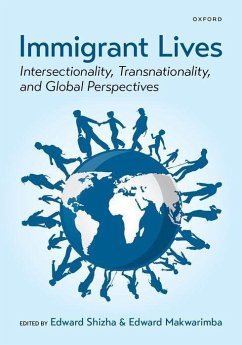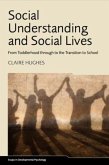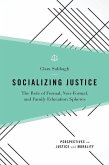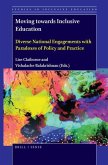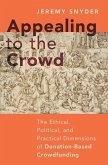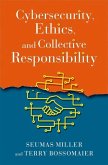Immigrant Lives
Intersectionality, Transnationality, and Global Perspectives
Herausgeber: Shizha, Edward; Makwarimba, Edward
Immigrant Lives
Intersectionality, Transnationality, and Global Perspectives
Herausgeber: Shizha, Edward; Makwarimba, Edward
- Gebundenes Buch
- Merkliste
- Auf die Merkliste
- Bewerten Bewerten
- Teilen
- Produkt teilen
- Produkterinnerung
- Produkterinnerung
This volume focuses on processes, motivations, policies, and practices that influence international migration and the experiences of migrating and settling in a new country. With chapter contributions by international and interdisciplinary scholars, academics and researchers from Africa, Australia, Europe, Latin America, and North America, the book examines and interrogates some immigration policies, while capturing migration and transnational experiences from migratory hotspots in different parts of the world.
Andere Kunden interessierten sich auch für
![Human Nature And Conduct Human Nature And Conduct]() John DeweyHuman Nature And Conduct36,99 €
John DeweyHuman Nature And Conduct36,99 €![Social Understanding and Social Lives Social Understanding and Social Lives]() Claire HughesSocial Understanding and Social Lives187,99 €
Claire HughesSocial Understanding and Social Lives187,99 €![The Scope and Limits of Partiality The Scope and Limits of Partiality]() Diane JeskeThe Scope and Limits of Partiality95,99 €
Diane JeskeThe Scope and Limits of Partiality95,99 €![Socializing Justice Socializing Justice]() Clara SabbaghSocializing Justice95,99 €
Clara SabbaghSocializing Justice95,99 €![Moving Towards Inclusive Education Moving Towards Inclusive Education]() Moving Towards Inclusive Education149,99 €
Moving Towards Inclusive Education149,99 €![Appealing to the Crowd Appealing to the Crowd]() Jeremy SnyderAppealing to the Crowd87,99 €
Jeremy SnyderAppealing to the Crowd87,99 €![Cybersecurity, Ethics, and Collective Responsibility Cybersecurity, Ethics, and Collective Responsibility]() Seumas MillerCybersecurity, Ethics, and Collective Responsibility37,99 €
Seumas MillerCybersecurity, Ethics, and Collective Responsibility37,99 €-
-
-
This volume focuses on processes, motivations, policies, and practices that influence international migration and the experiences of migrating and settling in a new country. With chapter contributions by international and interdisciplinary scholars, academics and researchers from Africa, Australia, Europe, Latin America, and North America, the book examines and interrogates some immigration policies, while capturing migration and transnational experiences from migratory hotspots in different parts of the world.
Hinweis: Dieser Artikel kann nur an eine deutsche Lieferadresse ausgeliefert werden.
Hinweis: Dieser Artikel kann nur an eine deutsche Lieferadresse ausgeliefert werden.
Produktdetails
- Produktdetails
- Verlag: Hurst & Co.
- Seitenzahl: 624
- Erscheinungstermin: 18. August 2023
- Englisch
- Abmessung: 261mm x 188mm x 47mm
- Gewicht: 1184g
- ISBN-13: 9780197687307
- ISBN-10: 019768730X
- Artikelnr.: 67733159
- Herstellerkennzeichnung
- Libri GmbH
- Europaallee 1
- 36244 Bad Hersfeld
- gpsr@libri.de
- Verlag: Hurst & Co.
- Seitenzahl: 624
- Erscheinungstermin: 18. August 2023
- Englisch
- Abmessung: 261mm x 188mm x 47mm
- Gewicht: 1184g
- ISBN-13: 9780197687307
- ISBN-10: 019768730X
- Artikelnr.: 67733159
- Herstellerkennzeichnung
- Libri GmbH
- Europaallee 1
- 36244 Bad Hersfeld
- gpsr@libri.de
Edward Shizha is Professor in the Faculty of Liberal Arts at Wilfrid Laurier University in Canada. His research interests are in migration and transnationalism, racism and racialization, education and indigenous knowledge systems, decolonial theory, and support for immigrants and refugees. He has participated in several studies on support needs of immigrants and refugees and is the author of 13 books, including Living Beyond Borders: Essays on Global Immigrants and Refugee. He has also published several book chapters and journal articles which have been cited widely. Edward Makwarimba is a social scientist with 15+ years' experience working with immigrants and refugees on their settlement and integration needs, and well-being. As Co-Director of the Social Support Research Program, University of Alberta for eleven years, he worked on assessment and intervention support programs promoting the health of varied vulnerable populations including immigrants and refugees. Makwarimba also worked for Alberta Health Services as a senior research and evaluation consultant, as well as lead scientist, and has taught at both primary and university levels for several years. He has written numerous reports and academic papers on inclusion and health disparities.
* Table of Contents
* Chapter 1: Introduction to transnationalism, intersectionality and
migration ecological trajectories
* Edward Shizha and Edward Makwarimba
* SECTION I: THEORETICAL AND CONCEPTUAL FRAMEWORKS
* Chapter 2: (Re)materializing intersectionality in transnational
context
* Denise L. Spitzer
* Chapter 3: Rethinking race in research on migration: Transnational
literacies as a tool
* Patriann Smith, S. Joel Warrican, Alex Kumi-Yeboah and Tala Karkar
Esperat
* Chapter 4: Decolonizing diaspora studies: Accounting for the
transnational and intersectional interventions of 'striking'
diasporas
* Ipek Demir
* Chapter 5: 'Do we really belong here?' Transnationalism and the
temporality of naturalized citizenship
* Edward Shizha
* SECTION II: POLICIES GOVERNING TRANSNATIONAL MIGRATION AND SETTLEMENT
* ASIA
* Chapter 6: The Rohingya refugee situation: Seeking accountability,
relief, and solutions
* Brian Gorlick
* AUSTRALIA/SOUTH PACIFIC
* Chapter 7: 'Irregular' migration, intersectionality and race: The
demonization policy of refugees in Australia
* Dawn Bolger
* Chapter 8: African diasporic migration trends, relocation and
resettlement: An Australian perspective
* Kathomi Gatwiri, Leticia Anderson and Kiros Hiruy
* UNITED KINGDOM
* Chapter 9: Intersectionality and UK's multiscalar governance approach
to race, gender and asylum seeking in Scotland and England
* Emma Hill
* Chapter 10: The Windrush Generation and the British citizenship
policy
* Shelene Gomes and Arthur Torrington
* EUROPEAN UNION
* Chapter 11: The European Union's Border and Coast Guard Agency
(Frontex): Between impunity and accountability
* Omer Karasapan
* Chapter 12: Data evidence-informed migration policies in Africa and
Europe? A transnational perspective
* Marzia Rango and Irene Schöfberger
* Chapter 13: The (in)coherence of European migration policy: Between
securitization and protection
* Paloma González del Miño and Concepción Anguita Olmedo
* Chapter 14: Regulating without redistributing? A review of the main
EU responses to the 'migrant crisis'
* Stefano M. Torelli and Anna Longhini
* NORTH AMERICA
* Chapter 15: How Canada deals with asylum seekers and refugees in
theory and practice
* Herbert Grubel
* Chapter 16: Intersectionality and the US Deferred Action for
Childhood Arrivals (DACA) program
* Karla Rodriguez Beltran and Erin R. Hamilton
* SECTION III: INTRA-REGIONAL/CONTINENTAL MIGRATION AND IMMIGRANTS'
EXPERIENCES
* Chapter 17: Of ranks and peripheries: Weaponizing difference against
immigrants in Southern Africa
* Christopher Changwe Nshimbi
* Chapter 18: Overcoming barriers to informal enterprising: Congolese
self-settled refugee women in urban Eswatini
* Gabriel Tati
* Chapter 19: Food self-sufficiency: Evidence from a land security
framework to a protracted refugee situation in Uganda
* Elsemarie Jorissen and Maliamungu Habib Uthuman
* Chapter 20: The Rohingya exodus to Bangladesh: Livelihood pursuits,
hope for assimilation and the associated risks
* Hossain Ahmed Taufiq and Mahmood Muttaqee
* Chapter 21: Immigration, policies and socio-racial hierarchies: The
Latin American experience
* Luisa Feline Freier and Leon Lucar Oba
* SECTION IV: SETTLEMENT, IDENTITIES AND BELONGING IN A HOST COUNTRY
* Chapter 22: Why do ethnic citizens identify more with their cultural
groups than with the state in
* Canada
* Kon K. Madut
* Chapter 23: Immigrants as potential development resource to countries
of origin: A contextual report card on sub-Saharan African newcomers
to Canada
* Philomina Okeke-Ihejirika
* Chapter 24: Gender norm attitudes among Nigerian and Angolan migrants
in the Netherlands
* Bilisuma B. Dito and Victor Cebotari
* Chapter 25: Transnational lives and the impacts of the COVID-19
pandemic on immigrants, and
* refugees
* Edward Shizha
* Chapter 26: Access to labour market justice for migrant workers in
Australia
* Anna Boucher
* SECTION V: EQUITY, DIVERSITY AND INCLUSION: FOUNDATIONS FOR SOCIAL
JUSTICE FOR IMMIGRANT SETTLEMENT AND INTEGRATION
* Chapter 27: Wastage of human capital? Underutilization of foreign
trained immigrant professionals and highly skilled workers in Canada
* Edward Shizha
* Chapter 28: Introducing migrants into urban politics or into urban
migrant politics in Spain?
* Juan Carlos Triviño-Salazar
* Chapter 29: Language training and humanitarian migrants' host
language skills: Recent evidence from Australia
* Zhiming Cheng, Massimiliano Tani Bertuol, and Ben Zhe Wang
* Chapter 30: 'Thou art welcome': The mental well-being of immigrants
and refugees in Canada
* Magnus Mfoafo-M'Carthy
* Chapter 31: Conclusion: Directions for further migration research,
policy making, theorization, and immigrants' settlement and
integration programming
* Edward Makwarimba and Edward Shizha
* Chapter 1: Introduction to transnationalism, intersectionality and
migration ecological trajectories
* Edward Shizha and Edward Makwarimba
* SECTION I: THEORETICAL AND CONCEPTUAL FRAMEWORKS
* Chapter 2: (Re)materializing intersectionality in transnational
context
* Denise L. Spitzer
* Chapter 3: Rethinking race in research on migration: Transnational
literacies as a tool
* Patriann Smith, S. Joel Warrican, Alex Kumi-Yeboah and Tala Karkar
Esperat
* Chapter 4: Decolonizing diaspora studies: Accounting for the
transnational and intersectional interventions of 'striking'
diasporas
* Ipek Demir
* Chapter 5: 'Do we really belong here?' Transnationalism and the
temporality of naturalized citizenship
* Edward Shizha
* SECTION II: POLICIES GOVERNING TRANSNATIONAL MIGRATION AND SETTLEMENT
* ASIA
* Chapter 6: The Rohingya refugee situation: Seeking accountability,
relief, and solutions
* Brian Gorlick
* AUSTRALIA/SOUTH PACIFIC
* Chapter 7: 'Irregular' migration, intersectionality and race: The
demonization policy of refugees in Australia
* Dawn Bolger
* Chapter 8: African diasporic migration trends, relocation and
resettlement: An Australian perspective
* Kathomi Gatwiri, Leticia Anderson and Kiros Hiruy
* UNITED KINGDOM
* Chapter 9: Intersectionality and UK's multiscalar governance approach
to race, gender and asylum seeking in Scotland and England
* Emma Hill
* Chapter 10: The Windrush Generation and the British citizenship
policy
* Shelene Gomes and Arthur Torrington
* EUROPEAN UNION
* Chapter 11: The European Union's Border and Coast Guard Agency
(Frontex): Between impunity and accountability
* Omer Karasapan
* Chapter 12: Data evidence-informed migration policies in Africa and
Europe? A transnational perspective
* Marzia Rango and Irene Schöfberger
* Chapter 13: The (in)coherence of European migration policy: Between
securitization and protection
* Paloma González del Miño and Concepción Anguita Olmedo
* Chapter 14: Regulating without redistributing? A review of the main
EU responses to the 'migrant crisis'
* Stefano M. Torelli and Anna Longhini
* NORTH AMERICA
* Chapter 15: How Canada deals with asylum seekers and refugees in
theory and practice
* Herbert Grubel
* Chapter 16: Intersectionality and the US Deferred Action for
Childhood Arrivals (DACA) program
* Karla Rodriguez Beltran and Erin R. Hamilton
* SECTION III: INTRA-REGIONAL/CONTINENTAL MIGRATION AND IMMIGRANTS'
EXPERIENCES
* Chapter 17: Of ranks and peripheries: Weaponizing difference against
immigrants in Southern Africa
* Christopher Changwe Nshimbi
* Chapter 18: Overcoming barriers to informal enterprising: Congolese
self-settled refugee women in urban Eswatini
* Gabriel Tati
* Chapter 19: Food self-sufficiency: Evidence from a land security
framework to a protracted refugee situation in Uganda
* Elsemarie Jorissen and Maliamungu Habib Uthuman
* Chapter 20: The Rohingya exodus to Bangladesh: Livelihood pursuits,
hope for assimilation and the associated risks
* Hossain Ahmed Taufiq and Mahmood Muttaqee
* Chapter 21: Immigration, policies and socio-racial hierarchies: The
Latin American experience
* Luisa Feline Freier and Leon Lucar Oba
* SECTION IV: SETTLEMENT, IDENTITIES AND BELONGING IN A HOST COUNTRY
* Chapter 22: Why do ethnic citizens identify more with their cultural
groups than with the state in
* Canada
* Kon K. Madut
* Chapter 23: Immigrants as potential development resource to countries
of origin: A contextual report card on sub-Saharan African newcomers
to Canada
* Philomina Okeke-Ihejirika
* Chapter 24: Gender norm attitudes among Nigerian and Angolan migrants
in the Netherlands
* Bilisuma B. Dito and Victor Cebotari
* Chapter 25: Transnational lives and the impacts of the COVID-19
pandemic on immigrants, and
* refugees
* Edward Shizha
* Chapter 26: Access to labour market justice for migrant workers in
Australia
* Anna Boucher
* SECTION V: EQUITY, DIVERSITY AND INCLUSION: FOUNDATIONS FOR SOCIAL
JUSTICE FOR IMMIGRANT SETTLEMENT AND INTEGRATION
* Chapter 27: Wastage of human capital? Underutilization of foreign
trained immigrant professionals and highly skilled workers in Canada
* Edward Shizha
* Chapter 28: Introducing migrants into urban politics or into urban
migrant politics in Spain?
* Juan Carlos Triviño-Salazar
* Chapter 29: Language training and humanitarian migrants' host
language skills: Recent evidence from Australia
* Zhiming Cheng, Massimiliano Tani Bertuol, and Ben Zhe Wang
* Chapter 30: 'Thou art welcome': The mental well-being of immigrants
and refugees in Canada
* Magnus Mfoafo-M'Carthy
* Chapter 31: Conclusion: Directions for further migration research,
policy making, theorization, and immigrants' settlement and
integration programming
* Edward Makwarimba and Edward Shizha
* Table of Contents
* Chapter 1: Introduction to transnationalism, intersectionality and
migration ecological trajectories
* Edward Shizha and Edward Makwarimba
* SECTION I: THEORETICAL AND CONCEPTUAL FRAMEWORKS
* Chapter 2: (Re)materializing intersectionality in transnational
context
* Denise L. Spitzer
* Chapter 3: Rethinking race in research on migration: Transnational
literacies as a tool
* Patriann Smith, S. Joel Warrican, Alex Kumi-Yeboah and Tala Karkar
Esperat
* Chapter 4: Decolonizing diaspora studies: Accounting for the
transnational and intersectional interventions of 'striking'
diasporas
* Ipek Demir
* Chapter 5: 'Do we really belong here?' Transnationalism and the
temporality of naturalized citizenship
* Edward Shizha
* SECTION II: POLICIES GOVERNING TRANSNATIONAL MIGRATION AND SETTLEMENT
* ASIA
* Chapter 6: The Rohingya refugee situation: Seeking accountability,
relief, and solutions
* Brian Gorlick
* AUSTRALIA/SOUTH PACIFIC
* Chapter 7: 'Irregular' migration, intersectionality and race: The
demonization policy of refugees in Australia
* Dawn Bolger
* Chapter 8: African diasporic migration trends, relocation and
resettlement: An Australian perspective
* Kathomi Gatwiri, Leticia Anderson and Kiros Hiruy
* UNITED KINGDOM
* Chapter 9: Intersectionality and UK's multiscalar governance approach
to race, gender and asylum seeking in Scotland and England
* Emma Hill
* Chapter 10: The Windrush Generation and the British citizenship
policy
* Shelene Gomes and Arthur Torrington
* EUROPEAN UNION
* Chapter 11: The European Union's Border and Coast Guard Agency
(Frontex): Between impunity and accountability
* Omer Karasapan
* Chapter 12: Data evidence-informed migration policies in Africa and
Europe? A transnational perspective
* Marzia Rango and Irene Schöfberger
* Chapter 13: The (in)coherence of European migration policy: Between
securitization and protection
* Paloma González del Miño and Concepción Anguita Olmedo
* Chapter 14: Regulating without redistributing? A review of the main
EU responses to the 'migrant crisis'
* Stefano M. Torelli and Anna Longhini
* NORTH AMERICA
* Chapter 15: How Canada deals with asylum seekers and refugees in
theory and practice
* Herbert Grubel
* Chapter 16: Intersectionality and the US Deferred Action for
Childhood Arrivals (DACA) program
* Karla Rodriguez Beltran and Erin R. Hamilton
* SECTION III: INTRA-REGIONAL/CONTINENTAL MIGRATION AND IMMIGRANTS'
EXPERIENCES
* Chapter 17: Of ranks and peripheries: Weaponizing difference against
immigrants in Southern Africa
* Christopher Changwe Nshimbi
* Chapter 18: Overcoming barriers to informal enterprising: Congolese
self-settled refugee women in urban Eswatini
* Gabriel Tati
* Chapter 19: Food self-sufficiency: Evidence from a land security
framework to a protracted refugee situation in Uganda
* Elsemarie Jorissen and Maliamungu Habib Uthuman
* Chapter 20: The Rohingya exodus to Bangladesh: Livelihood pursuits,
hope for assimilation and the associated risks
* Hossain Ahmed Taufiq and Mahmood Muttaqee
* Chapter 21: Immigration, policies and socio-racial hierarchies: The
Latin American experience
* Luisa Feline Freier and Leon Lucar Oba
* SECTION IV: SETTLEMENT, IDENTITIES AND BELONGING IN A HOST COUNTRY
* Chapter 22: Why do ethnic citizens identify more with their cultural
groups than with the state in
* Canada
* Kon K. Madut
* Chapter 23: Immigrants as potential development resource to countries
of origin: A contextual report card on sub-Saharan African newcomers
to Canada
* Philomina Okeke-Ihejirika
* Chapter 24: Gender norm attitudes among Nigerian and Angolan migrants
in the Netherlands
* Bilisuma B. Dito and Victor Cebotari
* Chapter 25: Transnational lives and the impacts of the COVID-19
pandemic on immigrants, and
* refugees
* Edward Shizha
* Chapter 26: Access to labour market justice for migrant workers in
Australia
* Anna Boucher
* SECTION V: EQUITY, DIVERSITY AND INCLUSION: FOUNDATIONS FOR SOCIAL
JUSTICE FOR IMMIGRANT SETTLEMENT AND INTEGRATION
* Chapter 27: Wastage of human capital? Underutilization of foreign
trained immigrant professionals and highly skilled workers in Canada
* Edward Shizha
* Chapter 28: Introducing migrants into urban politics or into urban
migrant politics in Spain?
* Juan Carlos Triviño-Salazar
* Chapter 29: Language training and humanitarian migrants' host
language skills: Recent evidence from Australia
* Zhiming Cheng, Massimiliano Tani Bertuol, and Ben Zhe Wang
* Chapter 30: 'Thou art welcome': The mental well-being of immigrants
and refugees in Canada
* Magnus Mfoafo-M'Carthy
* Chapter 31: Conclusion: Directions for further migration research,
policy making, theorization, and immigrants' settlement and
integration programming
* Edward Makwarimba and Edward Shizha
* Chapter 1: Introduction to transnationalism, intersectionality and
migration ecological trajectories
* Edward Shizha and Edward Makwarimba
* SECTION I: THEORETICAL AND CONCEPTUAL FRAMEWORKS
* Chapter 2: (Re)materializing intersectionality in transnational
context
* Denise L. Spitzer
* Chapter 3: Rethinking race in research on migration: Transnational
literacies as a tool
* Patriann Smith, S. Joel Warrican, Alex Kumi-Yeboah and Tala Karkar
Esperat
* Chapter 4: Decolonizing diaspora studies: Accounting for the
transnational and intersectional interventions of 'striking'
diasporas
* Ipek Demir
* Chapter 5: 'Do we really belong here?' Transnationalism and the
temporality of naturalized citizenship
* Edward Shizha
* SECTION II: POLICIES GOVERNING TRANSNATIONAL MIGRATION AND SETTLEMENT
* ASIA
* Chapter 6: The Rohingya refugee situation: Seeking accountability,
relief, and solutions
* Brian Gorlick
* AUSTRALIA/SOUTH PACIFIC
* Chapter 7: 'Irregular' migration, intersectionality and race: The
demonization policy of refugees in Australia
* Dawn Bolger
* Chapter 8: African diasporic migration trends, relocation and
resettlement: An Australian perspective
* Kathomi Gatwiri, Leticia Anderson and Kiros Hiruy
* UNITED KINGDOM
* Chapter 9: Intersectionality and UK's multiscalar governance approach
to race, gender and asylum seeking in Scotland and England
* Emma Hill
* Chapter 10: The Windrush Generation and the British citizenship
policy
* Shelene Gomes and Arthur Torrington
* EUROPEAN UNION
* Chapter 11: The European Union's Border and Coast Guard Agency
(Frontex): Between impunity and accountability
* Omer Karasapan
* Chapter 12: Data evidence-informed migration policies in Africa and
Europe? A transnational perspective
* Marzia Rango and Irene Schöfberger
* Chapter 13: The (in)coherence of European migration policy: Between
securitization and protection
* Paloma González del Miño and Concepción Anguita Olmedo
* Chapter 14: Regulating without redistributing? A review of the main
EU responses to the 'migrant crisis'
* Stefano M. Torelli and Anna Longhini
* NORTH AMERICA
* Chapter 15: How Canada deals with asylum seekers and refugees in
theory and practice
* Herbert Grubel
* Chapter 16: Intersectionality and the US Deferred Action for
Childhood Arrivals (DACA) program
* Karla Rodriguez Beltran and Erin R. Hamilton
* SECTION III: INTRA-REGIONAL/CONTINENTAL MIGRATION AND IMMIGRANTS'
EXPERIENCES
* Chapter 17: Of ranks and peripheries: Weaponizing difference against
immigrants in Southern Africa
* Christopher Changwe Nshimbi
* Chapter 18: Overcoming barriers to informal enterprising: Congolese
self-settled refugee women in urban Eswatini
* Gabriel Tati
* Chapter 19: Food self-sufficiency: Evidence from a land security
framework to a protracted refugee situation in Uganda
* Elsemarie Jorissen and Maliamungu Habib Uthuman
* Chapter 20: The Rohingya exodus to Bangladesh: Livelihood pursuits,
hope for assimilation and the associated risks
* Hossain Ahmed Taufiq and Mahmood Muttaqee
* Chapter 21: Immigration, policies and socio-racial hierarchies: The
Latin American experience
* Luisa Feline Freier and Leon Lucar Oba
* SECTION IV: SETTLEMENT, IDENTITIES AND BELONGING IN A HOST COUNTRY
* Chapter 22: Why do ethnic citizens identify more with their cultural
groups than with the state in
* Canada
* Kon K. Madut
* Chapter 23: Immigrants as potential development resource to countries
of origin: A contextual report card on sub-Saharan African newcomers
to Canada
* Philomina Okeke-Ihejirika
* Chapter 24: Gender norm attitudes among Nigerian and Angolan migrants
in the Netherlands
* Bilisuma B. Dito and Victor Cebotari
* Chapter 25: Transnational lives and the impacts of the COVID-19
pandemic on immigrants, and
* refugees
* Edward Shizha
* Chapter 26: Access to labour market justice for migrant workers in
Australia
* Anna Boucher
* SECTION V: EQUITY, DIVERSITY AND INCLUSION: FOUNDATIONS FOR SOCIAL
JUSTICE FOR IMMIGRANT SETTLEMENT AND INTEGRATION
* Chapter 27: Wastage of human capital? Underutilization of foreign
trained immigrant professionals and highly skilled workers in Canada
* Edward Shizha
* Chapter 28: Introducing migrants into urban politics or into urban
migrant politics in Spain?
* Juan Carlos Triviño-Salazar
* Chapter 29: Language training and humanitarian migrants' host
language skills: Recent evidence from Australia
* Zhiming Cheng, Massimiliano Tani Bertuol, and Ben Zhe Wang
* Chapter 30: 'Thou art welcome': The mental well-being of immigrants
and refugees in Canada
* Magnus Mfoafo-M'Carthy
* Chapter 31: Conclusion: Directions for further migration research,
policy making, theorization, and immigrants' settlement and
integration programming
* Edward Makwarimba and Edward Shizha

